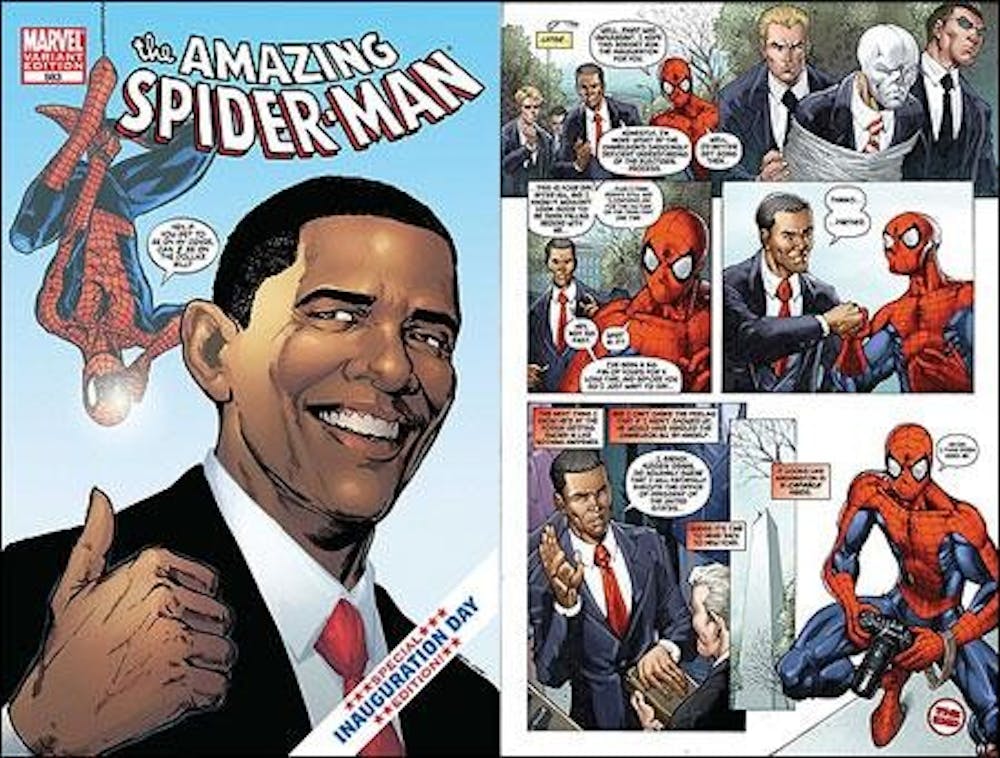Ever since Captain America punched Adolf Hitler in the face on the cover of his very first issue, the American comics industry has always commented on the contemporary political atmosphere, if not always as blatantly as it did in 1943.
Since he started it all, it’s only fitting that Captain America stirred up a fit of controversy recently when he – inadvertently, according to Marvel Editor-in-Chief Joe Quesada – condemned the Tea Party movement as racist in Ed Brubaker’s “Captain America #602.” In the story, Captain America is observing a white supremacy march and one of the signs being held by a protestor clearly reads “TEA BAG THE LIBERAL DEMS BEFORE THEY TEA BAG YOU” – an actual sign famously photographed by the Washington Post at a Tea Party march in Washington, D.C.
The controversy rose to a fever pitch in the days following the issue’s release, and Quesada had to issue a formal apology. The backpedaling read as follows:
“On the following page featuring the protestors again, there were signs, but nothing written in them. From a continuity standpoint, this omission stood out like a sore thumb, but was easily fixable. So, just before the book went to the printer, the editor asked the letterer on the book to just fudge in some quick signs. The letterer in his rush to get the book out of the door but wanting to keep the signs believable, looked on the net and started pulling slogans from actual signs. That’s when he came upon this one.
And used it in the scene and off it went to the printer. Unfortunately, to make the deadline, the work wasn’t double-checked thoroughly, and it was printed as is, which is where we as an editorial group screwed up. We spoke to the letterer, and he was mortified at his mistake and was truly sorry as he had no political agenda. He was just trying to do his job, but ultimately the onus falls on me as E-i-C. All that said, we caught the mistake two weeks ago, after it was printed and removed the sign from the art files so that it no longer appears in future reprints of the title or collections. So, while the crowd protesting has nothing to do with the villains in the story, we in no way meant to say they were associated with the Tea Party movement, it was a simple perfect storm of screw-ups. It happens, we’re human.”
Alright, that’s fair. It was a mistake. Ed Brubaker was not calling the Tea Party protestors racists, and neither was Captain America. The official story makes Marvel sound bumbling, but certainly not overtly political. Still, there’s something deeply unsatisfying about this explanation. Sure, it’s the most likely one, but there’s a part of me that hopes it was totally intentional. The politics Brubaker expresses here might be of questionable taste, but it would at least show that he has the balls to be political in a comic about a superhero who fights for what’s right for America. It’s not like it would be the first time it happened.
Spencer Ackerman of the Attackerman Blog summed it up best:
“I’ve read Ed Brubaker’s run as Captain America writer and this strikes me as entirely commensurate with the stories Brubaker tells portraying Cap as a redeeming figure for an increasingly hysterical country. (And his “death” as jostling America’s moral gyroscope.) Captain America would tell the teabaggers that they ought to consider that freedom is something rather more than the top marginal tax rate. Marvel is a huge corporate entity, so I get that it can’t be so overtly political, but c’mon — one of the villains of Siege’s accompanying Embedded book is based on Glenn Beck. Norman Osborn demands that the enemies of the Dark Avengers be taken alive “for enhanced interrogation.”
It’s somewhat disconcerting to think that Marvel needs to be concerned about being political. Comics have consistently been one of the most political sources of alternative media since their inception. Captain America’s very existence is evidence. Alan Moore’s title character in "V for Vendetta" is a terrorist against an increasingly authoritarian British government, and that book was released during the Thatcher Administration. Brian K. Vaughan’s hero in "Ex Machina" is the dope-smoking, gay marriage-legalizing mayor of New York City, and his allegoric family of lions in "Pride of Baghdad" walked through an Iraqi warzone before being gunned down by American troops. Politics are not something new to comics, and if Brubaker meant to belittle the Tea Party, then he should have been allowed to, Disney-Marvel buyout or not.
Comic Talk #8

Get stories like this in your inbox
Subscribe





